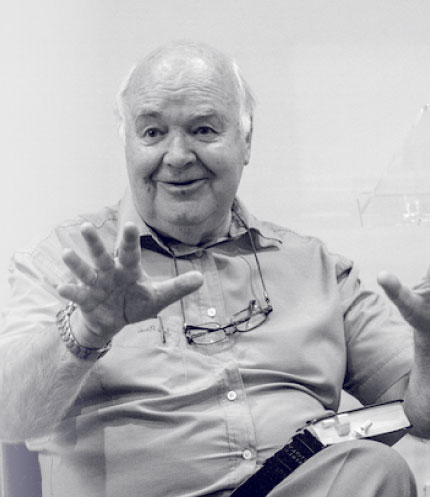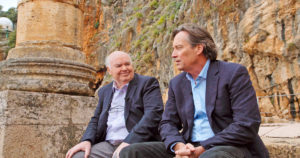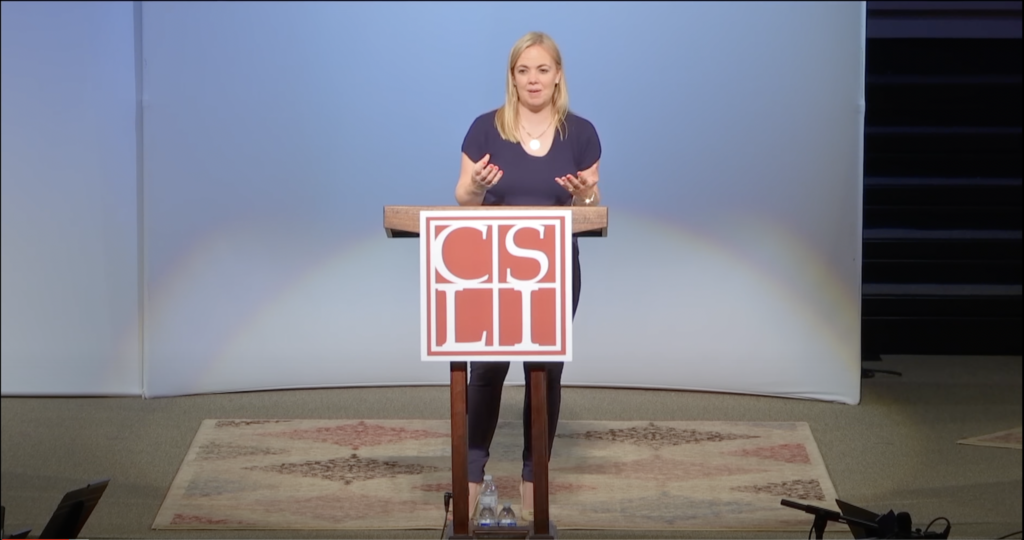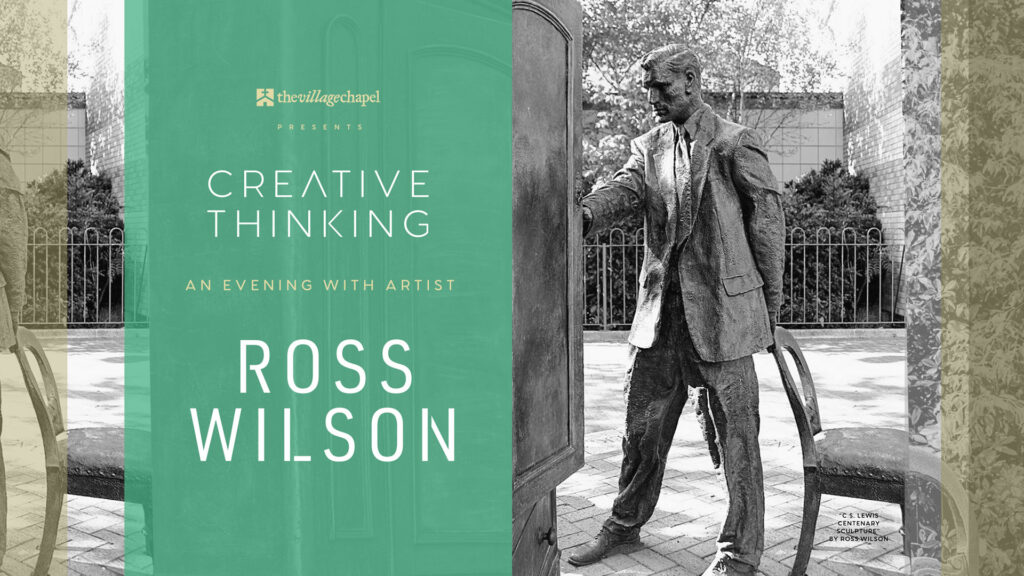Jim Thomas: Hey folks, I’m pastor Jim Thomas from The Village Chapel here in Nashville, Tennessee. Alongside me is Professor John C. Lennox, Professor of Mathematics in the University of Oxford., Fellow in Mathematics at the Philosophy of Science and Pastoral Advisor at Green Templeton College in Oxford. He’s the author of many books, including his widely popular God’s Undertaker: Has Science Buried God? and that speaks about the interface between science, philosophy and theology.
As well, John has a book we’re going to be talking about today – Seven Days That Divide The World. I’m very excited about that because it coincides with our beginning of study at The Village Chapel here on the book of Genesis. Let me welcome John Lennox. John, you’re speaking to us over in England, I believe, right?
John C. Lennox: I am indeed. I’m just outside Oxford in the country, in the famous Cotswold country…
Jim: … Been over there once or twice myself to England and so enjoyed each and every trip. I can just imagine what a delight it is to live right near Oxford there. Your history as I recall, your own story takes you– You’ve been in Oxford quite a bit. Were you a student there in university?
John: No, I grew up in Northern Ireland and then when I was about 18, 19, I went to Cambridge [to study] Mathematics. I spent seven years in Cambridge, did my PhD there and then took up a teaching post at the University of Wales where I was for over 27 years.
Jim: Wow.
John: Then I went from there to the University of Oxford and I’ve been 20 odd years here. I’ve been around a little bit.
Jim: That’s true. Of course, you speak widely, you’ve written many other books as well. We’re going to actually talk about the seven days book in a little bit, but I also think folks would be really curious about your book Where Is God In A Coronavirus World? How has that been received, John?
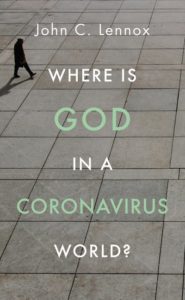
John: That’s been received wonderfully well. What happened was that when we were told that this was a serious not only epidemic, but pandemic, I thought we’re going to be shut in and what am I going to be able to do? I thought that perhaps I could try to write something that would help Christians particularly, but not only them to understand the nature of the pandemic and to look at it from a biblical point of view because it raises a huge series of questions.
The main one being Where Is God In A Coronavirus World? That’s actually the title of the book. I wrote it by working very hard for a single week. I finished it Saturday night and by the next Wednesday, it was already in print. It’s now around the world in over 30 languages. In answer to your question, I’m really encouraged in the response of people to it.
It seems to have struck a note. I don’t try to behave as if I knew all the answers because we don’t.
The problem of suffering and evil is one of the hardest that any of us face, whether we’re Christians or not. I wanted to try to show that Christianity has actually something very important to say into a world that’s suffering where there’s a huge number of desperately ill people and many, many deaths. Christianity does have something very important to say, and I tried to say it. That book is available very easily on the internet. It’s one of the cheapest books you’ll ever buy. For many people in the two thirds of the worlds, it was made available on the internet without any cost.
Jim: Wow. That’s great. Well, you also, I believe in the last year have released a book on artificial intelligence, is that correct?
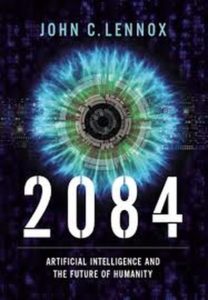 John: Yes. I’ve written a book called 2084: Artificial Intelligence and the Future of Humanity. Of course, that takes off from George Orwell’s book, Nineteen Eighty-Four, which was the dystopia where he imagined the world of 1984. That book has left its imprint on our language even, thoughts, speak and big brother’s watching you and all that kind of thing. Because many of the things that Orwell said are being realized around our world today, people are talking about artificial intelligence.
John: Yes. I’ve written a book called 2084: Artificial Intelligence and the Future of Humanity. Of course, that takes off from George Orwell’s book, Nineteen Eighty-Four, which was the dystopia where he imagined the world of 1984. That book has left its imprint on our language even, thoughts, speak and big brother’s watching you and all that kind of thing. Because many of the things that Orwell said are being realized around our world today, people are talking about artificial intelligence.
I thought it might be a good idea because there’s a great deal of confusion and not only confusion, but actual fear. People concerned about what’s going to happen. I thought I’d write a book that would take a careful look at what AI is, what its good aspects are because there are many of those and what its negative aspects are.
Particularly to distinguish between the AI that actually works, which normally means that you’ve got a system that does a single thing very well that normally takes human intelligence to do so we call it artificial intelligence. It’s not real intelligence. Then all the hype that is the futuristic ideas of uploading our brains onto silicon or turning ourselves into gods as Yuval Noah Harari, the best-selling Israeli author thinks.
I wanted to investigate that carefully because the Bible has a great deal that is important to say about this striving to rebuild the tower of Babel, so to speak and reach for the heavens and turn ourselves into some kind of gods by genetic engineering. These are hugely important topics. The book is available. There’s a video series that goes with it and all the rest of it.
Jim: Do you address, I’m sure you do, some of the ethical concerns of the way some of the corporations, for instance, can control the flow of information or ideas or the kind of identity stuff that might be manipulated from afar. I suppose there are all kinds of like you said, fears that people have.
John: Yes, indeed. The question say of well, we can easily explain this by thinking of visual recognition technologies and you start with the good side. For instance, X-rays. Here’s a typical AI system in medicine. You take a million photographs of people’s lungs. You get the best doctors to label them with the diseases they represent. That’s your database. Then we take a photograph of your lungs and the AI system, which is a computer, compares the photograph of your lungs with all the others and it comes up with a diagnosis.
 Now these days that diagnosis will probably be better than the one you get at your local hospital. You can see the value of that is colossal. Just change it a bit and you move to facial recognition. Now you can see that law enforcement people are delighted to have a tool where they can pick out terrorists in a stadium or they can recognize criminals in a railway station and so on.
Now these days that diagnosis will probably be better than the one you get at your local hospital. You can see the value of that is colossal. Just change it a bit and you move to facial recognition. Now you can see that law enforcement people are delighted to have a tool where they can pick out terrorists in a stadium or they can recognize criminals in a railway station and so on.
Of course, the downside is that facial recognition technology can be used to intrude very seriously upon people’s privacy and that raises all kinds of ethical questions, especially when you realize that in certain parts of the world, this kind of technology is being increasingly used actually to control minority populations. That is a frightening development. That really is 1984. It’s come a long time before 2084.
You’re right. The ethics of the situation is important and that’s why I believe that I want to encourage bright, young, scientifically-minded Christians to work on the positive side of AI, but to think about these negatives so that they can contribute to building in strong ethical norms into the systems. Because, of course, we have to do that. The norms, say, that are obeyed by a self-driving vehicle, they will be the ethical norms of the people programming that vehicle. Where do their values come from? That means that the discussion of values is now central to contemporary technology and some of the really big names realize it. That’s encouraging but I’m not too sanguine about the question of getting international agreement on this kind of ethics although we should try to do so.
Jim: I was speaking with a friend of yours, Os Guinness, not too long ago and he was actually on one of these Friday Night Chats that we do as well. He asked me a question, “What keeps you awake at night?” I said the lack of consensus on values and you’ve just hit it right square on. If we don’t have some consensus or some shared common values, how can we ever get to a place where we share the same ethical concerns and come to the same ethical conclusions?
John: It’s a very serious question because in a sense, our generation or the one before is the last generation that was deeply influenced by the Judeo-Christian tradition ethics of the 10 commandments. Now there’s such a press towards subjectivism and relativism, your truth and my truth, your values and my values that people have become completely anaesthetized to realizing that without a shared system of values that are independent of ourselves and that’s a crucial thing, society collapses.
“…there’s such a press towards subjectivism and relativism, your truth and my truth, your values and my values that people have become completely anaesthetized to realizing that without a shared system of values that are independent of ourselves and that’s a crucial thing, society collapses.” – John C. Lennox
We need to make that very clear and that is of course, where the Christian biblical worldview comes into its own because it tells us yes, there is a transcendent set of values. God made us moral beings in His own image and therefore, if we look to Him and His Word, we can discover a real basis on which society can operate. These are vital things to be thought about. That’s the reason we can’t go to sleep at night because these values are being undermined all over the place even by people that claim to be Christians, sadly.
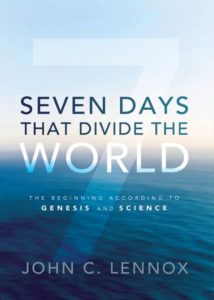 Jim: Well, that makes a great transition for what I really wanted to talk to you about The Seven Days That Divide the World book. Because as you say in that book …You talk about how what we think about Genesis chapter one is so critical as it relates to our world view. John, what are the big worldview questions as you see it that Genesis one addresses and gives us hope and I’d even say, joy about?
Jim: Well, that makes a great transition for what I really wanted to talk to you about The Seven Days That Divide the World book. Because as you say in that book …You talk about how what we think about Genesis chapter one is so critical as it relates to our world view. John, what are the big worldview questions as you see it that Genesis one addresses and gives us hope and I’d even say, joy about?
John: The book of Genesis is absolutely foundational to any understanding of the Bible. People often asked me, what are the big questions that have interested me all my life? I say there are two main ones, the first one is about the universe, is it a creation or not? Is there a God behind this universe or is it just something that has apparently appeared by random unguided processes?
The second question is about the status of human life. Is it made in the image of God or not? Now, the first of those questions is answered in Genesis 1 and the second of those questions is answered both in Genesis 1 and in the chapters that succeed. That is so absolutely crucially important. The difference between believing that the universe is an intended creation of God and that human beings are also intended by God and made in His image is very important.
Many people have not quite noticed that the universe shows God’s glory. I have a telescope in my garden and on the rare occasions when you can see the starry heavens, I look up and look at the galaxies. Andromeda is one of my favorites, a hundred billion stars. It’s hard to get your mind around it. It shows God’s glory. The stars were not made in God’s image, only human beings were. Jim, to get right to the point here, that is the basis of a true value system.
I was intrigued not long ago listening to Jordan Peterson giving talks on the book of Genesis. He came to the statement, Genesis 1:26, “And God said, ‘Let us make man in our own image,’“ and it describes how God made men and women in His image and likeness. He paused and he said, “Man, that is the cornerstone of western civilization. We neglect it at our peril. In fact it’s the source of all value.”
There’s a Historian in Oxford called Tom Holland who’s become world famous in recent days writing a book called Dominion. Which describes how he’s moved from a position of thinking that we owed everything to the ancient Greeks to discovering that really behind western civilization, the most important influence is the influence of scripture. I find that book absolutely fascinating because he’s not seeing it through pious eyes like a seminary student so to speak, but he’s seeing it through eyes that understand the history of the world.
Here we have the beginnings of a foundation for life and without them, we are completely adrift. It’s interesting that Genesis begins with the statement, “In the beginning, God created the heavens and the earth,” that is He created everything. At the beginning of John’s gospel, we get an explanation of that a bit more detail, “In the beginning was the Word, and the Word was with God, the Word was God. The same was in the beginning with God. All things came to be through Him.”
Now, I’m translating it correctly. Often we read that and many translations say all things were made by Him, and that of course is true. The actual Greek word is all things came to be through Him. Now, why is that important? Well, because in the beginning the Word already was. That is an existence statement that God revealed in Genesis and in the Bible as a whole is eternal. He never began to exist but the universe and you and I did begin to exist and we began to exist because God called us into existence.
“If we could get it into our heads just how important the fundamental doctrine that there is a creator is, the details of how and when He did it are not unimportant but they’re nowhere near as important as that He did it.” – John C. Lennox
Now, these are profound ideas. One of the sad things to my mind is many Christians are a bit scared of Genesis because they’ve heard many arguments about some of the details. If we could get it into our heads just how important the fundamental doctrine that there is a creator is, the details of how and when He did it are not unimportant but they’re nowhere near as important as that He did it. You can tell that easily from the new testament. It doesn’t discuss when He did it or how He did it, it simply says that He did it.
In fact the name of my book Seven Days That Divide the World, if you only heard the new testament, you’d never heard of the seven days and they wouldn’t have divided Christians as they do. My book is really a plea for a sense of proportion. I regard all scripture as important. I believe it to be the inspired Word of God but we need to realize that– here I make a very fundamental observation, you will meet Christians who agree on all the basic doctrines of scripture. They agree on the fact of creation, they agree on the pre-existence of Christ, they agree on the details of His life, His miracles, His atoning death, His resurrection, His ascension, and His return but they disagree on the interpretation of Genesis one.
Now, that tells me look, there seems to be a little bit of space for disagreement here and the tragedy is when the world outside that doesn’t care any anything about the seven days of creation, whatever they might mean, sees Christians fighting about it as if it was an absolute deep matter on which we could excommunicate one another and so on, I just leave center proportion. Let’s ask ourselves, what does the world think of our disagreements at this level? If we discuss it in-house, that’s fine, but let’s make sure we never put people off thinking that there was a creation. Get the facts first before you go into the details.
Jim: I love the your book, Seven Days That Divide The World is five chapters, and then five appendices. I love that in there you have that that first section on the history of people’s attitude and view concerning the origin of all things. You do a wonderful chapter on the hermeneutics, the interpretation of the biblical passage, which I really appreciate that you included that. You also talk about yam, that Hebrew word, which is about the day, one day or a day. You pointed out the definite article is missing. Is it the first five of the days? Is that what I remember, is that right?
John: [laughs] Yes, it is a date. The interesting thing is that some people insist that you see a word like day, yom in Hebrew and a must always mean the same thing. Just read Genesis one. The first mention of it, this actually amuses me slightly, is God called the light, day and the darkness, He called night. The first use of the word is not 24 hours, it’s 12 hours of the equator, you see. Then of course, there’s a sequence, day, a second day, and so on, so forth, with evenings and mornings that are normally taken by most scholars to be a 24 hour day, but then you get God rested.
Interestingly enough, you don’t have the formula of those evening and morning, seventh day. Most scholars, and I mean, evangelical, serious scholars, believe that the seventh day actually has never ended. It is an indefinite period of time, during which God does no creating, but He doesn’t cease working for our redemption and all the rest of it. Of course, in chapter two, verse one, you have the statement that in the day they were created. Which day is that? Then you realize that the word day, even in English, has yet another meaning. I often used to say that people, “In my young day at Cambridge”, what day was that, Tuesday, Wednesday or Thursday?
Jim: [laughs]

John: The word day is used in most languages also as an indefinite period of time in the past. Here in Genesis 1 , we have arguably, three or four different meanings for the word day, but then there’s a final point that you mentioned first. It’s this, that Hebrew has a definite article … the day, but it is no indefinite article. The sequence is not as in many translations. If you read them, they say, the first day, the second and so on, but that is not what it [chuckles] says. The definite article is missing on the first five of those days. It’s better to be thought of possibly as day one, day two, day three or our first day, our second, but certainly not the.
It changes and it’s the sixth and the seventh, which presumably puts emphasis on those two elements in the sequence, which makes a lot of sense because the sixth is the pinnacle of God’s creation of human beings and the seventh is when He completed all and He rests.
What I conclude looking at that is that this is a very sophisticated thing. No wonder, people, for thousands of years, not just hundreds of years or since Charles Darwin or something like that, have a difficulty with these verses because they are so deep and sophisticated. We should watch lest our dogmatism trips us up and we start saying things that cannot be substantiated. That’s the kind of thing I advance in my book or at least it’s the beginning of it.
Jim: I think that’s just brilliant. I know around here in Nashville, sometimes I get thought of as a fellow that, as we might say in the slang, geeks out on some of these things. I think they make a huge difference. I love as you say, the way an ancient text like this actually is showing such great sophistication. I believe that word, Earth, is also used in more than one way and that chapter.
John: It is.
Jim: It just reminds us that we must not say more than the text says, but yet we’ve got to say what the text says. I’m with you, I think it’s not so much an explanation of the process as much as it’s a declaration of the one who began it all and declares this.
John: That is so important to grasp that. Its sophistication is telling us about the richness of the language God has used to give us this information. We must take it seriously. You see, the charge that’s made at some people is they just listen to science and they don’t take the Bible seriously. Of course, that’s a mistake. I am very interested in science as a scientist, but I take scripture very seriously because it’s the inspired Word of God. What I’ve discovered is that the more seriously you take Scripture, the less difficulty you have in teasing out an explanation that doesn’t insult people’s intelligence.
If you ask yourself, what is clear about this text? Number one, that God is the Creator. Number two, that He didn’t create everything all at once, whatever you believe, about the days there is a sequence. Number three, every member of that sequence begins with “and God said”. Whatever time period is represented, that is the exact opposite of a mindless, unguided evolutionary process. This is God speaking. It’s as if Genesis 1, is unpacking John 1. All things came to be through the Word.
This is how they came to be, “and God said”, “and God said”. We could, perhaps put it this way, that Genesis reveals the universe to be a series of speech acts, not in the normal human sense, because I can speak and convey information, but I cannot speak and something comes into existence, like universe, or stars, or planets, and so on. That’s what God does. The crucial thing is that God had a series of intervals, whatever they may be, and that can be discussed, inputs information and power into an ongoing situation. That creation act stops once He has created men and women in His image.
Do you know what I like the best about that sequence? It’s the thing nobody ever notices as far as I can see.
Jim: [laughs] What’s that?
Jim: There’s another “and God said”, but it’s, “and God said to them”.
Jim: Oh, yes.
John: This is the first time God speaks. It’s showing us what it means to be made the image of God, that we can hear God’s Word, we can speak to God, we can listen to Him. Therefore, it’s indicating to us the deepest significance is to be had in human life in, if you like, linguistic fellowship and communication with the God that created us. This is big stuff. [chuckles] I feel that if we emphasize that, the little details which are not unimportant get into a correct proportion, and we got something wonderful to say it and people that they can see make sense.
“It’s showing us what it means to be made the image of God, that we can hear God’s Word, we can speak to God, we can listen to Him. Therefore, it’s indicating to us the deepest significance is to be had in… communication with the God that created us. This is big stuff.” – John C. Lennox
Jim: I love that. I know that you’ve read a bit of see C. John Collins as well.
John: Oh, yes. I find Jack Collins very helpful and indeed encouraging. It is stuff very well worth reading.
 Jim: I’ve got his book, Reading Genesis Well, and he’s a professor at the seminary that I graduated from some years ago. I’ve enjoyed reading your book alongside of his as well. He talks about a person that I know has had a great impact on your own life, C. S Lewis. He talks about this critically intuitive approach to understanding or interpreting Genesis. You’ve mentioned linguistics, and I think that’s linguistics, rhetoric and perhaps literary style that Jack Collins talks about. Your own experience, I know with C. S Lewis, you– A lot of our folk that come to our church are familiar with him, but you actually heard the man speak, didn’t you?
Jim: I’ve got his book, Reading Genesis Well, and he’s a professor at the seminary that I graduated from some years ago. I’ve enjoyed reading your book alongside of his as well. He talks about a person that I know has had a great impact on your own life, C. S Lewis. He talks about this critically intuitive approach to understanding or interpreting Genesis. You’ve mentioned linguistics, and I think that’s linguistics, rhetoric and perhaps literary style that Jack Collins talks about. Your own experience, I know with C. S Lewis, you– A lot of our folk that come to our church are familiar with him, but you actually heard the man speak, didn’t you?
John: I did.
Jim: What was that like?
John: I’m old, Pastor Jim. I’m old. In 1962 when I came to Cambridge, Lewis, I knew he was there. I didn’t know he was very ill, but I had already absorbed a huge amount of his writing. I’d read almost everything except the very technical articles on medieval English and so on, but I later read those as well. The maths lecture theater was just across the road from where he was lecturing on English, so I looked it up. Julie went and listened to what turned out to be the very last lectures he ever gave in the university on the poetry of John Donne, the so-called mystical poet.
The experience was quite remarkable. Actually, I tried to reproduce it in the recent film I’ve made with Kevin Sorbo of Hollywood fame and drama Hercules and so on. It was a very cold Winter and he was dressed in a very heavy coat, a hat, and a big thick scarf. He’d start to lecture the moment he came into the room bursting through double doors. He started lecturing while he picked his way among the students who were all over the floor and sitting on the window sills and all the rest of it. As he lectured and moved towards the podium, he was slowly divesting himself off his outer garments, unwinding his scarf, taking off his hat and coat.
By the time he got to the podium, he’d given us five minutes of a brilliantly constructed lecture. He went through for the next 50 minutes. That was the very amusing thing. He reversed the process, so still lecturing, he put on his hat, wound up his scarf, put on his coat. His last words were delivered as he plunged out into the cold through the double doors. There was no Q&A.
Jim: Wow, what a treat, how amazing.
John: It was a treat, and of course, his method of thinking– He wasn’t a scientist and that for me, was important. He understood the philosophy of science though. I’m very fortunate in terms of education that my public education was mainly in mathematics and philosophy of science. I had a mentor who was very much a C. S Lewis figure, the humanities, a professor of Latin and Greek. He trained me in the ancient humanities just as Lewis had been trained so I was able to benefit enormously from Lewis’s stuff.
Jim: You’ve also, as I recall, in some of the material I’ve read on you and on your website as well, you’ve got some background with a fella named John Polkinghorne as well. What I’m just completely fascinated when I listen to you speak or read your books is that all of these different disciplines converge. They all come together and it helps, I think, to round out what you’ve mentioned before, your world view. In other words, you’re not merely looking at this from one discipline. I appreciate that so much, John.
It helps because you can tell a story that causes you to chuckle and then causes me to chuckle about C. S Lewis divesting himself off of his clothes and then at the same time he’s talking about literature and then there’s John Polkinghorne talking about quantum physics. These are both men of faith.

John: That’s correct. John actually taught the course on quantum mechanics that I attended, but I benefited from him mainly not in quantum mechanics, although I’ve been revisiting that whole topic recently. I benefited from him in his many writings on science and religion because he thinks extremely clearly and communicated to me a number of ideas that I’ve quoted in a number of my books. It’s very important for someone in my position to interact with leading figures who are quality scientists at the very top order and are Christian believers.
Jim: I think that’s equipped you well. I’ve seen you’ve also debated some of these so-called new atheists, Richard Dawkins, the late Christopher Hitchens, and some others as well, as I recall. It’s that interface that has equipped you so well to be able to dialogue with some of those folks, right?
John: It’s kind of you to say so. I tend to let other people judge but certainly, I got to the stage where I’ve spent my life being interested in why people believe what they believe. I’ve made a particular study of the polar opposite of my Christian convictions, and that is atheism. I’ve spent quite a bit of time during the Cold War behind the Iron Curtain and then after that in Russia and Ukraine discussing these things with people. That was a very good preparation for taking on the likes of Richard Dawkins, Hitchens, [Peter] Singer, and a number of others.
I didn’t ask to be catapulted as I was into the public scene, but I felt that it’s very important that some Christians stand up in the public sphere because otherwise, the atheists who get far more media exposure than we ever do, there’s no level playing field, they appear to have the leading arguments. I don’t believe that at all, so I want to get into that sphere. I was very fortunate to be able to do some very high-level debates that are still being watched today by hundreds of thousands if not millions of people.
Jim: I’d encourage our viewers today if they would be interested in such things to see some of your lectures and some of your talks that you’ve given at Trinity Forum and some of the other Veritas Forums. I’d encourage them to look at some of those. John, I’ve collected three of my very favorite John Lennox quotes from a couple of your books and a couple of your talks. I’m just wondering if I were to read them and we were to post them on the screen, would you maybe perhaps give us a little context or if you want to, amplify a little bit of each one of them?
“Either human intelligence ultimately owes its origin to mindless matter or there’s a creator. It is strange that some people claim that it is their intelligence that leads them to prefer the first to the second.” – John C. Lennox
I love this one, “Either human intelligence ultimately owes its origin to mindless matter or there’s a creator. It is strange that some people claim that it is their intelligence that leads them to prefer the first to the second.” That’s brilliant.
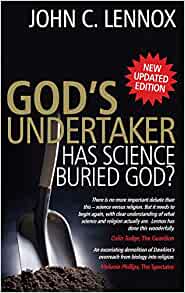 John: I think it’s the final sentence in my book, God’s Undertaker, which was the first major book that I wrote on this topic. The background to it is very simply this, that if you believe that your mind is simply the end product of mindless unguided processes, I think this ends up in absurdity. Let me illustrate it by what I sometimes do when I get discussing these things with leading scientists. I ask them what they do their science with and they realize I’m talking about– They say, “I do my science with my–” They’re about to say mind when they remember it’s not politically correct to believe in the mind, so they say, “With my brain.”
John: I think it’s the final sentence in my book, God’s Undertaker, which was the first major book that I wrote on this topic. The background to it is very simply this, that if you believe that your mind is simply the end product of mindless unguided processes, I think this ends up in absurdity. Let me illustrate it by what I sometimes do when I get discussing these things with leading scientists. I ask them what they do their science with and they realize I’m talking about– They say, “I do my science with my–” They’re about to say mind when they remember it’s not politically correct to believe in the mind, so they say, “With my brain.”
I say, “Okay, I actually believe the brain and the mind are both real, but they’re distinct. I’ll stay with you for the minute. You do science with your brain? Tell me about your brain? What’s the brief history of the brain?” “Well, that’s easy. It’s the end product of mindless physical processes, unguided.” “Oh yes? You trust it? Let me ask you an honest question? I want a straight answer to it. If you knew that the computer you use every day was the product of unguided, natural forces, would you trust it?” The interesting thing is I’ve always got the explicit answer no to that, so I now smile and say, “You have a problem”.
You see, what I am contending and I’m not the only one, C.S Lewis saw this long ago, Alvin Plantinga saw it, and wrote very convincingly about it, but perhaps the most important of all is Thomas Nagle, the atheist philosopher who sees the point. That if you set up a theory, here’s how C.S Lewis put it, any theory that invalidates the workings of the mind cannot be true because you’ve used thinking to reach it. My chief objection to atheism is not that I’m a Christian, it’s that I’m a scientist and atheism taken to a logical conclusion undermines faith and the very rationality you need not only to do science but anything else, so that’s the story behind that.
“It is rather ironical that in the 16th century some people resisted advance in science because it seemed to threaten belief in God, whereas in the 20th century, scientific models of a beginning were resisted because they might increase the plausibility of belief in God.” – John C. Lennox
Jim: That’s a great quote. This one as well– it is from Gunning for God. Your book called Gunning for God, which I also have read, you said, “It is rather ironical that in the 16th century some people resisted advance in science because it seemed to threaten belief in God, whereas in the 20th century, scientific models of a beginning were resisted because they might increase the plausibility of belief in God.”
John: That’s correct and I remember that happening in the 1960s when for centuries people had gone with Aristotle, believing in an eternal universe. Then suddenly there came these evidences that the universe appeared to be expanding and things like that introduced by the way by a catholic priest Georges Lemaître and eventually it came to Penzias’ discovery for which he and someone else got the Nobel prize of the so-called microwave background.
Jim: That’s right.
 John: The evidence that there was a beginning to space-time became overwhelming, and the reaction in the United Kingdom at the very top level of science in the words of the editor of the most important scientific journal in the world, Nature, a man called Maddox, who said something like this,: that we mustn’t give in to this idea of a beginning because it will give too much leverage to people who believe the Bible.
John: The evidence that there was a beginning to space-time became overwhelming, and the reaction in the United Kingdom at the very top level of science in the words of the editor of the most important scientific journal in the world, Nature, a man called Maddox, who said something like this,: that we mustn’t give in to this idea of a beginning because it will give too much leverage to people who believe the Bible.
It’s quite remarkable actually and it’s an important thing that we know this, that this is the fact that at that level, I talk about a convergence between genesis and contemporary science because I’m well aware as a scientist that scientists change their minds so I don’t want to over dogmatize. There’s a consensus at the moment which Christians ought to welcome.
Sometimes you see I meet people that say, “We don’t like the words big bang, no Christians should believe in the big bang.” Just a moment, the words big bang, that’s just a label on a mystery. It’s simply acknowledging there was a beginning, well we acknowledge that except we add to it the fact that the beginning had a cause and the cause was an eternal creator, God.
No Christian should be afraid of the label “big bang,” it was actually coined by Sir Fred Hoyle, who was one of my examiners at Cambridge and he didn’t like it at all — “you and your ‘big bang’” —, he didn’t seem to welcome that because he believed in the steady state universe. We need to be very careful to understand exactly what it is people are saying. The Bible has more to tell us in that sense about the ultimate cause. Science has no ultimate cause.
“It is utterly clear in scripture that God does not expect us to believe without evidence, it is not blind faith.” – John C. Lennox
Jim: Well that’s great too. The third quote I wanted to put up was one I heard you say and you said, “It is utterly clear in scripture that God does not expect us to believe without evidence, it is not blind faith.” Great summary just, I think great assurance reassurance too for believers not only would that be persuasive perhaps as you’re sharing your faith with someone who’s objecting because they say it’s just blind faith but I think for believers, when we listen to your talks or when we listen to Sam Allberry or we listen to a Rebecca McLaughlin, whatever, we’ve got these these folks that have studied at a level most of us don’t have an opportunity to.
They’re just giving us– Alvin Plantinga as well like you just mentioned him or Francis Collins we’re being given great resources, I think, to help reassure us that what our minds and what our senses are perceiving there’s a correspondence between what we see and experience and what the Bible is claiming is true.

John: That’s absolutely right and it’s probably a very good point to bring our fascinating conversation to its climax because this is such an important question. It’s important because the concept of faith has been redefined by people like Richard Dawkins and Christopher Hitchens and they actually talk nonsense. They say that faith is believing where there’s no evidence or where we know that it isn’t true. Now that’s blind faith and to say that the Bible encourages blind faith is almost blasphemous.
We need to investigate this, because faith, the English word, comes from the Latin fide, from which we get fidelity, where it concentrates on emphasizes reliability, trustworthiness and all the rest of it. Faith, belief are exactly the same concept. Now, evidence-based faith is something we all understand. Some people once thought they could trust, they could have faith in bankers and they discovered that the bankers let them down and we had a financial crisis.
If you remember as many of our viewers will, the markets froze until the evidence came back that the banks could be trusted and slowly but surely it built up again. This is hugely important. Everybody understands the need for evidence. If you go in to borrow money to buy a house and you say to the banker, “Look I want to borrow $100,000.” “Yes well we may lend it to you, what evidence are you going to show us that you’re trustworthy?” “Just trust me. It’ll be fine, Trust me.” That’ll never get you anywhere. They want to know the collateral, the value of the real estate you have and all the rest of it.
We all know what evidence-based trust is. Not only that but in connection with facts what’s happening and trusting people, we base it on evidence or else we’re fools, we live in a day where a lot of people are talking about fake news and fake news is information that is passed out where there’s no substantiating evidence. The key thing in all of this is very simple, what is it that Jesus expects us to do? On what basis does He expect us to trust Him? The gospel of John explains this perfectly.
In chapter 20, it says this, John writes, “Jesus did many other signs that are not written in this book, but these are written that you might believe, that you might have faith that Jesus is the Christ, the Messiah, the Son of God and that through believing, you might have life in His name.”
Now that is so important. These things are written in order that you might believe. In other words, I have selected a group of signs like Jesus turning water into wine, like He’s feeding the 5000, like He’s raising Lazarus, like His own resurrection. John is bringing those as evidence upon which faith can be based. This is the exact opposite of blind faith. Jesus will never expect anyone to believe something for which there’s no evidence and that is so massively important.
Jim: That’s so brilliant.
“…sometimes, we’ll be asked to trust where the way forward is not completely clear and, we don’t have all the evidence that we’d need to have, but then we do have evidence. We have the evidence of all the past experiences of trusting God and have been proved true.” – John C. Lennox
John: There is a caveat and that is this, as we mature as Christians, God will lead us deeper and deeper into an experience of what it means to trust him and sometimes, we’ll be asked to trust where the way forward is not completely clear and, we don’t have all the evidence that we’d need to have, but then we do have evidence. We have the evidence of all the past experiences of trusting God and have been proved true.
In every case, Christianity is characterized being an evidence-based faith or belief system. That is, we’re believing where there is evidence, not in the absence of evidence. If we did that, we would be fools.
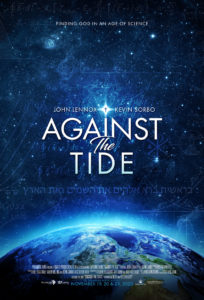 I really appreciate your asking that question because there’s a battle going on in the world today for the very meaning of faith. So many of our contemporaries and younger people, if you ask them, “What is faith?” They’ll say, “Faith is a religious word that means believing whether there’s no evidence. Faith is an ordinary word and it doesn’t mean believing whether there’s no evidence. It’s only valuable if there is evidence and it’s only reliable to the extent that there’s evidence behind it. So that’s a hugely important thing.
I really appreciate your asking that question because there’s a battle going on in the world today for the very meaning of faith. So many of our contemporaries and younger people, if you ask them, “What is faith?” They’ll say, “Faith is a religious word that means believing whether there’s no evidence. Faith is an ordinary word and it doesn’t mean believing whether there’s no evidence. It’s only valuable if there is evidence and it’s only reliable to the extent that there’s evidence behind it. So that’s a hugely important thing.
Jim: Oh, that’s so good. Thank you, John. You mentioned the movie earlier. I just wanted to get you to give me a couple of sentences on the movie. I believe it’s called, Against The Tide and what was the purpose of the movie and where can people find it if they want to see that?
John: The movie was a very interesting thing to do. Although film is not my genre, but the basic idea against the tide is in one sense, a record of my standing up in the public space to debate with Dawkins and Hitchens and so on. There are many excerpts in the film of doing that and all kinds of situations, but it’s in two parts and Kevin Sorbo, who acted the atheist professor in God’s Not Dead, the Genesis of it is very simple. People who know that film, they’ll probably not remember, but the young student who confronted the atheist professor used the arguments from my books to do so.
That’s explicitly so my name is mentioned in the film, and the idea is that Kevin Sorbo now having finished that film and as an actor in his own right, and as a person who is himself, a believer and very interested in these things wonders how a mathematician at Oxford that presumably has a career quite independent of his Christian commitment, why he dares to come out of his comfort zone and challenge people like Dawkins.
He comes to Oxford to find out the first part of the film is where he and I go around various situations in Oxford discussing the big questions that are mainly raised from the perspective of science and logic about the Christian faith.
Jim: Wow.
John: Then he comes to a point where he says, “Look, it’s all very well talking about science and evidence for God and the universe, but you’re a Christian. How do you make that step to the specificity of Christianity?” I say to him, “Look the best way to do that as far as both to go where it all started, why don’t I invite you to dinner in Galilee?” Off we go to Israel in the second part of the film investigates specifically Christian belief in light of the evidence. It’s all about evidence in the Holy land.
The film was presented, particularly in the US for limited release and was shown in a number of cinemas. Of course, the lockdown made it very difficult, but I understand that it will be out very soon on DVD and Blu-ray and things like that. It will be readily available.
Jim: Excellent.
John: If you want to know about it, it’s produced by Pensmore Films, and it’s a Kharis production. If you look at my website, Johnlennox.org, you will find out about it.
Jim: Okay. Good.
John: I hope that many people will enjoy it. I’ve also written a book to accompany it because this film is designed to stimulate thought, and it will not answer as many questions as it asks. I’ve written a book to go deeper in to every section of it to fill it out for those people who want to follow it a bit further. That will be coming out very soon to a company it.
Jim: Well, John, thank you for that. We’ll post some of this information on a slide right as this particular broadcast ends so that people can write that down. We’ll also include a link to this discussion on our website here at thevillagechapel.com. Thank you so much for being with us on this edition of Friday Night Chats here at the village chapel. We’ll also include it on our YouTube channel for the church and folks can go there and as they did with the other Friday Night Chats we’ve done.
I’m so grateful to you. I appreciate the way the Lord has used you to encourage believers as well as to persuade. I love the way that for folks like yourself, persuasion doesn’t have to be about being abrasive or anything like that. You’re so congenial and friendly and yet– the whimsical approach to me is much better. I just so appreciate that about you, John. Thank you for being with us.
John: Thank you very much, indeed, for inviting me on, and God bless you and your work in the church. Thank you.

